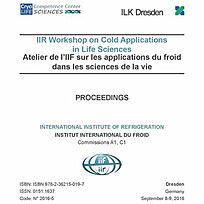
Document IIF
Importance de la formation de glace contrôlée pour garantir l'efficacité des biobanques de cellules.
Importance of controlled ice formation for efficient cell biobanking.
Numéro : pap. 007
Auteurs : LAUTERBOECK L., GRYSHKOV O., HOFMANN N., et al.
Résumé
Effective long-term storage of rare and clinically relevant cells depends on the cell type and thus requires optimization of the main process parameters involved in cryopreservation. Among these parameters, the cooling and thawing rates, as well as the temperature of nucleation can be adjusted by a specific cryopreservation method. In this work, we reveal the optimal conditions for cryopreservation of human fibroblasts (HF), human pulmonary microvascular endothelial cells (HPMECs), amnion (aMSCs), and bone marrow stem cells (bMSCs) using an electro-freezing method and applying 2.5 %, 5 % or 10 % (v/v) dimethyl sulfoxide (Me2SO) as a cryoprotective agent. The optimal nucleation temperature for freezing of HF was -10 °C for a cooling rate of 1 K·min-1 and -7.5 °C for 5 K·min-1 using 5 % Me2SO. Application of a cooling rate of 5 K·min-1 and induction of the ice formation at -12 °C resulted in 90 % of viable HPMECs. The aMSCs and bMSCs reflected the highest viability of 75 % after freezing using a two-step freezing protocol utilizing a cooling rate of 7.5 K·min-1 down to -30 °C and 3 K·min-1 down to -80 °C. The highest cell viability was observed while inducing the ice formation at -10 °C for both aMSCs and bMSCs.
Documents disponibles
Format PDF
Pages : 6 p.
Disponible
Prix public
20 €
Prix membre*
Gratuit
* meilleur tarif applicable selon le type d'adhésion (voir le détail des avantages des adhésions individuelles et collectives)
Détails
- Titre original : Importance of controlled ice formation for efficient cell biobanking.
- Identifiant de la fiche : 30019496
- Langues : Anglais
- Source : 2nd IIR Workshop on cold applications in life sciences.
- Date d'édition : 08/09/2016
- DOI : http://dx.doi.org/10.18462/iir.cals.2016.0007
Liens
Voir d'autres communications du même compte rendu (25)
Voir le compte rendu de la conférence
Indexation
- Thèmes : Influence du froid sur les cellules, tissus et organes
- Mots-clés : Glace; Cryobiologie; Cellule; Tissu; Nucléation; Experimentation; Cryoconservation
-
Cryopreservation of adherent cells in 96 well p...
- Auteurs : KILBRIDE P., MAHBUBANI K. T., LAMB S., et al.
- Date : 08/09/2016
- Langues : Anglais
- Source : 2nd IIR Workshop on cold applications in life sciences.
- Formats : PDF
Voir la fiche
-
Bio-inspired cryopreservation using synthetic p...
- Auteurs : BAILEY T. L., OTTEN L. C., GIBSON M. I.
- Date : 08/09/2016
- Langues : Anglais
- Source : 2nd IIR Workshop on cold applications in life sciences.
- Formats : PDF
Voir la fiche
-
Novel cryo-racks for different applications in ...
- Auteurs : KRETSCHMER R., REINSCH H., HEIDINGSFELDER J., et al.
- Date : 08/09/2016
- Langues : Anglais
- Source : 2nd IIR Workshop on cold applications in life sciences.
- Formats : PDF
Voir la fiche
-
Newly designed Tissue/cell storage bag for cryo...
- Auteurs : MOTOMURA N., SAITO A., KUROSAKI Y., et al.
- Date : 08/09/2016
- Langues : Anglais
- Source : 2nd IIR Workshop on cold applications in life sciences.
- Formats : PDF
Voir la fiche
-
Impact of frozen-thawed cord blood nucleated ce...
- Auteurs : MARTYNOVA Y. V., BABIYCHUK L. V., BABIYCHUK V. G., et al.
- Date : 08/09/2016
- Langues : Anglais
- Source : 2nd IIR Workshop on cold applications in life sciences.
- Formats : PDF
Voir la fiche
